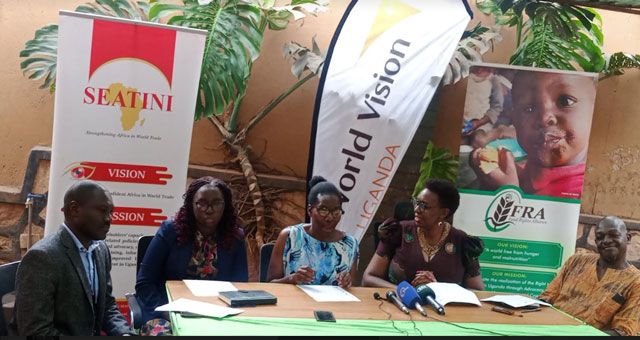
Kampala, Uganda | THE INDEPENDENT | The Uganda government should take a bold step and invest in the entire agricultural value chain to boost food production and address incidences of recurrent famine, according to the Civil Society Organisations (CSOs).
Speaking to the media in Kampala, 10 civil society organisations including SEATINI, World Vision, Food Rights Alliance, Afrifoods, Consent and CSBAG, said it is high time that the government invests in the entire agriculture value chain, from farmers farms, to storage, and markets.
Tony Ojok, the resilient livelihood advisor at World Vision said the country now needs strong extension services than before to reach all farmers countrywide.
“As a country, we need clear strategies to grow agriculture. Currently, extension workers cannot reach all farmers across the country, and this is coupled with the poor seed distribution system that has allowed poor quality seeds on the market that only deprives farmers of their little money,” he said.
Jane Nałunga, the executive director at the SEATINI Uganda said the non-functioning food markets in the country have also contributed to the problem of hunger where food is on high demand in one part of the country causing hikes and in abundance in others leading to low prices.
She noted that the government’s low investment in the agricultural sector is as a result of high level of indebtedness, leaving minimal resources for provision of services required to boost agricultural production.
“The country is currently in debt and clearly all the available resources are being spent on repayment,” Nalunga said.
“This leaves millions of Ugandans at the mercy of small holder farmers who use rudimentary means of farming .We need to support farmers to boost production by offering fertilizers and competitive markets. Value addition is equally important.”
Currently, Uganda government spent less than 10 per cent of its national budget on the agriculture sector annually even as more than three quarters of the population depend on it for food and jobs.
This comes as latest statistics from the Integrated Food Security Phase Classification indicates that all the nine districts in the Karamoja region are facing a severe food crisis. It is estimated that more than a half million people are facing high levels of acute food insecurity.
Hundreds of people are said to have died from hunger in northeastern region since June this year, with Napak Woman legislator, Faith Nakut, estimating that figure to be at least 600 due to prolonged drought and rampant insecurity.
Inhabited by nomadic pastoralists, the semi-arid and remote Karamoja region on the border with Kenya has long lagged behind the rest of Uganda in terms of development. Armed cattle thieves have worsened the situation.
790 tonnes of food distributed
The government on July, 19, dispatched 790 metric tonnes of relief food to Karamoja Sub-region. The Minister for Relief, Disaster Preparedness and Refugees, Hilary Onek, flagged off 552 metric tonnes of maize flour and 238 metric tonnes of beans for onward distribution to 600,000 people in Kotido, Kaabong, Moroto, Napak, Karenga and Nabilatuk districts.
Henry Kimera, the chairperson of the food Rights Alliance said the government need to ensure that consumers have access to high quality foods to guarantee a health population.
 The Independent Uganda: You get the Truth we Pay the Price
The Independent Uganda: You get the Truth we Pay the Price


